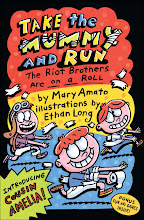Here's just part of the two-page letter a fifth grader from Bordentown, NJ, wrote after reading my book,
The Naked Mole-Rat Letters:“I liked that you made the main character, Frankie, so bold and brave. If she was boring, it would make the book boring.
By the way the character acts, it can make a story either really interesting or really boring. Since she was so bold, it gave the book action. I hate boring books.”
I think my reader hit on the reason why this book actually made it. Frankie's story begins with an autobiographical detail: she finds a love letter written to her father. The same thing happened to me when I was Frankie's age; however the autobiography ends there. I was timid and kept all my anxieties to myself--not such interesting material for a book. I deliberately gave Frankie the boldness that I didn't have.
Is your character passive or active? Ask yourself: what does the main character actually
do in the story? It's an important question to ask.




